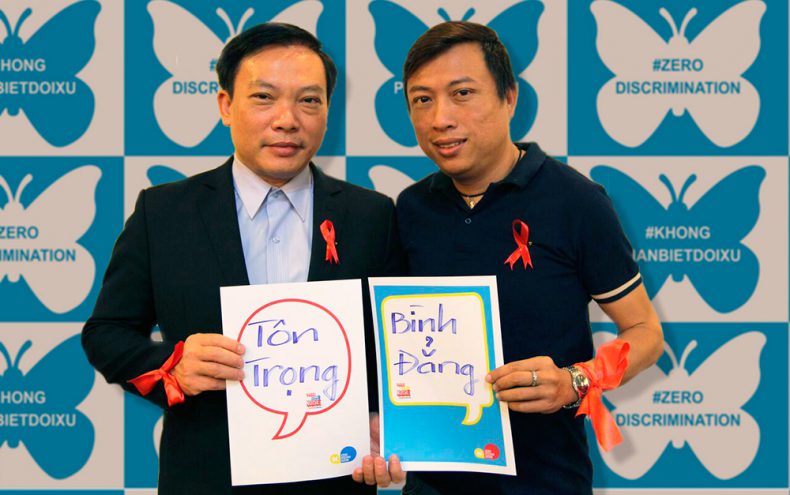Viet Nam embraces zero HIV-related discrimination in health care
HANOI, 1 March 2017. A demonstration project aiming at reducing HIV related discrimination in healthcare settings is underway in Ho Chi Minh City, as part of the broader effort of the Viet Nam Administration for AIDS Control (VAAC) to intensify anti- discrimination efforts toward ending AIDS by 2030, with support from UNAIDS.
Removing unnecessary fear of HIV among health workers
Inspired by the global movement, Viet Nam embarked on a new initiative in late 2016 to further reduce HIV-related discrimination in healthcare settings. Under the overall guidance of the Viet Nam Administration for AIDS Control (VAAC) and with support from UNAIDS, Ho Chi Minh City spearheaded the adaptation of a HIV-related discrimination survey tool and piloted a survey among health workers and service users in three health facilities in the city.
“We chose both general hospitals and HIV specialized health facilities for conducting this survey,” said Dr. Tieu Thi Thu Van, Director of Ho Chi Minh City Provincial AIDS Centre. “It provides us with scientific evidence of the level of HIV-related stigma and discrimination in health facilities that will inform interventions to create change among health workers. This demonstration project is therefore rather important.”
It is clear from the survey that discrimination related to HIV still exists in healthcare settings. 40% of the respondents who are HIV positive reported having experienced discrimination in health facilities. On the other hand, many health workers (about 70% of all respondents) applied over self- protection measures when taking care of people living with HIV due to their worry of getting HIV infection.
Informed by the results of this survey in late 2016, Ho Chi Minh AIDS Centre is working with the three health facilities to build staff HIV related stigma and discrimination knowledge and enhance their professional skills. A training toolkit has been adapted for Viet Nam based on the findings of this survey, and the training of trainers is underway from 28 February to 3 March 2017 for selected staff of the three health facilities and representatives of people living with and people at higher risk of HIV. Participants at the training of trainer workshop will also discuss plans for rolling out the training and development of a code of conducts related to zero HIV discrimination for their health facilities, as well as the role of community in the project implementation.
Discrimination-free health care for ending AIDS
“HIV-related discrimination in healthcare settings is a major barrier for Viet Nam to maximize HIV service uptake and achieve the 90-90-90 treatment target, so the country can firmly move toward ending AIDS by 2030,” said Mr. Ali Safarnejad, UNAIDS Viet Nam Acting Country Director.
“This is particularly important as Viet Nam is transitioning HIV services from donor financing to social health insurance funds whereby HIV services will be provided mostly at general hospitals and not specialized HIV clinics,” added Mr. Safarnejad.
The agenda on zero discrimination in health care, jointly initiated by UNAIDS and the World Health Organization’s Global Health Workforce Alliance nurtures respect for equality and aims to ensure healthy lives for all.
According to the global agenda, a national action plan on zero discrimination in healthcare settings should embrace seven priorities. Some of these priorities are very relevant for the response to HIV-related stigma and discrimination in Viet Nam, such as providing timely and quality healthcare regardless of HIV or other health status, or because of selling sex and using drugs; respecting patient’s privacy and confidentiality; prohibiting mandatory testing or coercive practices; and, ensuring participation of the affected communities.
Partnership for success
The initiative has been developed and implemented in close consultation with representatives of the Viet Nam Network of People Living with HIV (VNP+) while also engaging members of other HIV key affected populations.
“Reducing HIV-related discrimination is not only the task of health workers. We the people living with HIV also have to take part,” said Nguyen Anh Phong, VNP+ Steering Committee representative in southern Viet Nam. “We will work closely with the three health facilities to find appropriate solutions to address the existing discrimination that suits both health workers and community, so as to mobilize community participation in this effort.”
Participation of people living with HIV and key populations from conceptualization of the initiative, adaptation of the tool kit, conducting the survey, the training of trainers and training sessions at health facilities, as well as monitoring progress at health facilities is key to ensuring the project delivers expected results.
“We will conduct an assessment at the end of this pilot project. I hope lessons learned from this pilot will help further improve the methodology of measuring HIV-related discrimination in healthcare settings and intervention approaches, so we can expand the practice nation-wide,” said Dr. Hoang Dinh Canh, VAAC Vice Director.




